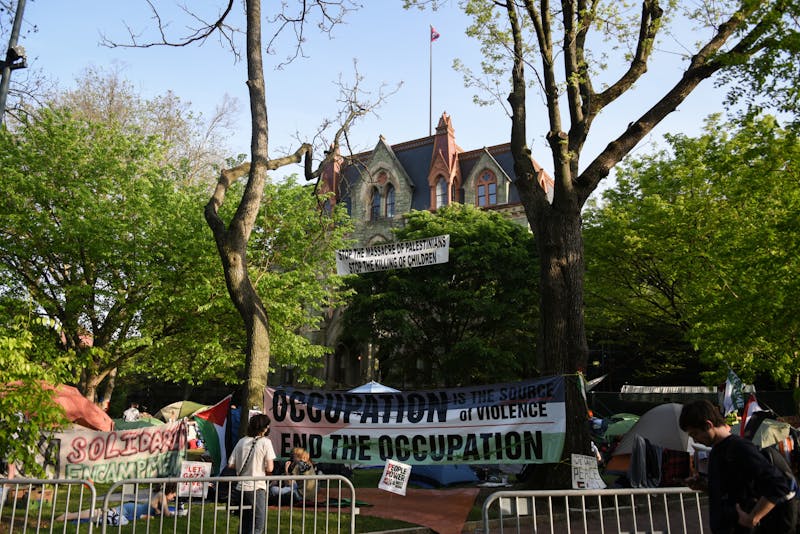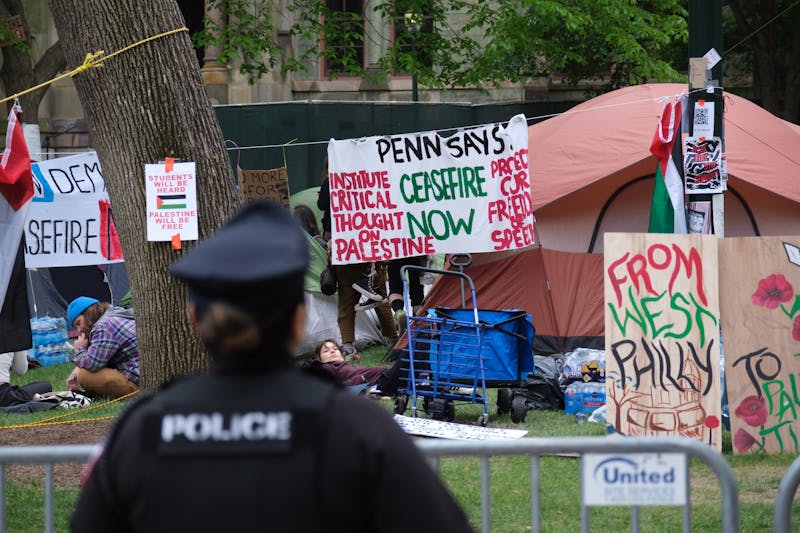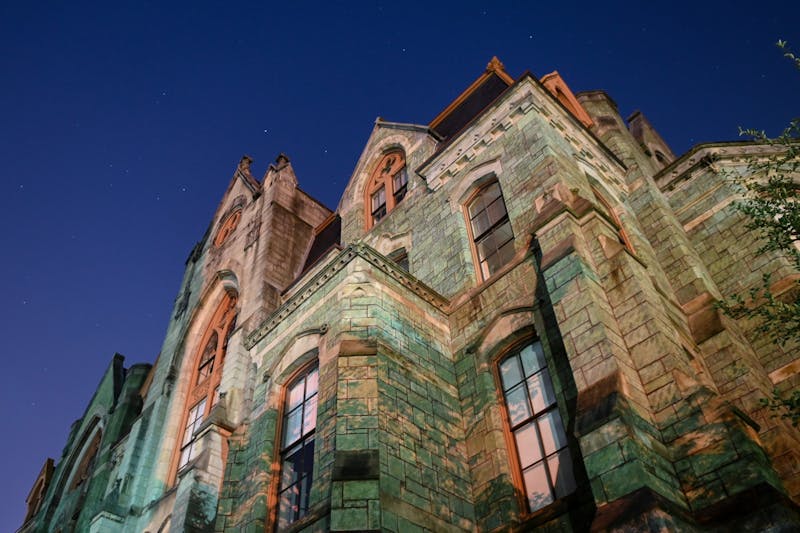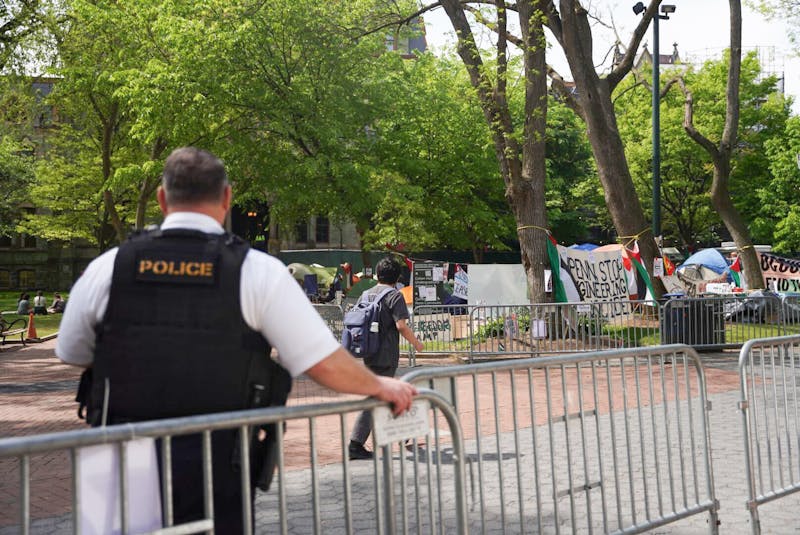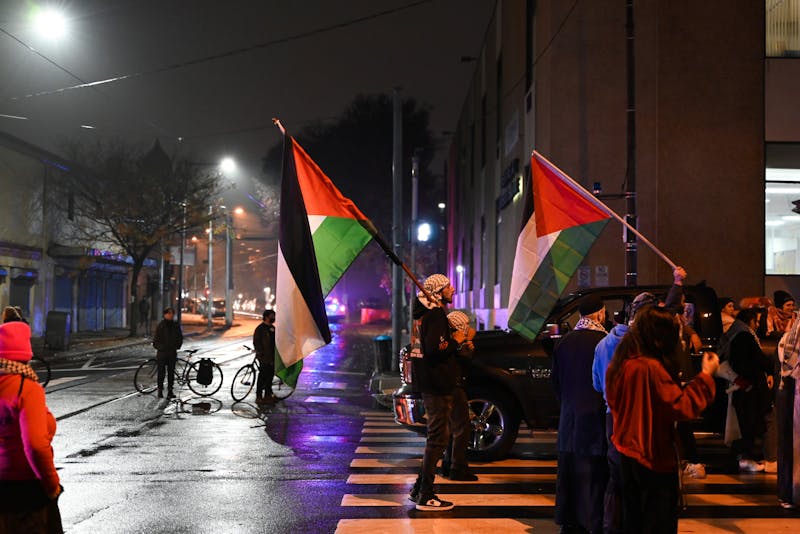
Penn has implemented new temporary guidelines for campus demonstrations and initiated a review of the Guidelines on Open Expression, according to an email sent to the University community Thursday morning.
The email — which was signed by Interim Penn President Larry Jameson, Provost John Jackson, Senior Executive Vice President Craig Carnaroli and deans from all 12 Penn undergraduate and graduate schools — contained updated guidance on “when, where, and how open expression can take place” and announced the formation of a task force to review the existing open expression policies.
The revised guidelines come after a semester at Penn that saw increased protests and tensions on campus, including an encampment on College Green that lasted 16 days. The new guidelines explicitly ban encampments.
In the email, administrators state that the updated guidelines are a response to requests throughout the year from members of the Penn community for University leadership to clarify and update their guidance and policies related to campus events and demonstrations. The message emphasizes that the request for “increased clarity” also was a “priority recommendation” in the final reports from both the University’s Task Force on Antisemitism and the Presidential Commission on Countering Hate and Building Community.
The Temporary Standards and Procedures for Campus Events and Demonstrations, which are effective immediately, greatly differ from the existing Guidelines on Open Expression, which were last updated in 1993.
The temporary guidelines have been “sourced from numerous existing policies and guidelines,” according to the message, and apply to “[a]ny member of the Penn community or Penn-affiliated organization wishing to schedule an event, such as a demonstration, protest, rally, or guest speaker on campus.”
In Instagram post Thursday afternoon, Penn Students Against the Occupation of Palestine condemned the new temporary guidelines, writing that “almost every stipulation in UPenn’s new ‘guidelines’ is a direct response to student-organized action.”
“The guidelines were published without prior input from the Committee on Open Expression,” the statement reads. “Instead, the dystopian restrictions have one goal in mind: stop protesting for Palestine.”
The statement concludes that no matter what consequences Penn threatens, “the students and the people will never be silenced.”
“The student intifada does NOT exist in a vacuum,” the caption of the post reads. “The University has sought to clamp down on our freedom of expression and our right to protest. SHAME ON YOU PENN.”
“To ensure the safety of the Penn community and to protect the health and property of individuals, encampments and overnight demonstrations are not permitted in any University location, regardless of space (indoor or outdoor),” the guidelines read. “Unauthorized overnight activities will be considered trespassing and addressed.”
The new guidelines make the distinction that all events at Penn are “presumed to be private” and require organizers of “non-academic” events looking to use outdoor spaces on campus to make a reservation two weeks in advance. Organizers are also limited to holding events during “stated business hours” without prior permission.
The guidelines specify that “amplified sound” on College Green is limited to the hours of 5 p.m. to 10 p.m., adding that “[r]egardless of time of day, amplified sound is not permitted” during periods such as reading days and final exams.
The temporary guidelines prohibit the use of “non-water soluble, semi-permanent, and permanent substances, including spray-chalk” on any University surface, including “vertical surfaces.” They also ban light projections on any University buildings or structures without permission from the Vice Provost for University Life or relevant dean’s office.
In the fall, pro-Palestinian groups Penn Students Against the Occupation of Palestine and the Philly Palestine Coalition posted photos of several messages projected onto Huntsman Hall, Irvine Auditorium, and Penn Commons on their Instagram stories. The images displayed phrases such as “Let Gaza live,” “From the river to the sea, Palestine will be free,” “Zionism is racism,” and “Penn funds Palestinian genocide.”
Penn denounced the projections, calling the displays antisemitic and “vile.”
Protesters are also not permitted to demonstrate on University sculptures and statues. “To preserve these structures and to reduce the risk of injury, University statues and sculptures may not be climbed on or covered with any material,” the guidelines read.
During the Gaza Solidarity Encampment, protesters chalked messages on the pavement surrounding College Green, projected films as part of their programming, and frequently climbed and chalked the Benjamin Franklin statue in front of College Hall.
The Gaza Solidarity encampment ended on May 10, when police in riot gear disbanded the encampment and arrested 33 protesters — nine of whom were Penn students.
The temporary guidelines also address the participation of non-Penn students in on-campus protests, clarifying that “non-University affiliated persons may have less expansive rights of open expression in University locations than those who are members of the Penn community.”
Non-Penn students are to abide by Penn’s Open Expression Guidelines as well as “any additional instructions from other University officials,” according to the guidelines.
Moreover, live streaming of events in spaces managed by “University Life Space and Events Management” is not allowed “except in limited circumstances where reaching a wider audience is appropriate” and approved by the VPUL.
Finally, the temporary guidelines protect the right of Penn’s Division of Public Safety officers and VPUL delegates to ask for Penn IDs in University spaces and emphasize that doing so does not “ordinarily” involve making a record of the information for purposes of disciplinary actions.
"Penn Public Safety or VPUL delegates who request ID information for purposes of a possible disciplinary action must give notice of this intention to any Penn ID holders at the time of making such a request," the guidelines read.
The email from University leadership also announced that a faculty task force will be charged with reviewing the Guidelines on Open Expression — a process that will begin this summer.
“This review will include the Task Force providing recommendations for consideration by the Committee on Open Expression (COE),” the email reads. “The COE, in turn, will present recommendations to the University Council. The University Council will then present final recommendations to the Interim President. As part of this effort, the Task Force will also be charged with reviewing the Temporary Standards and Procedures for Campus Events and Demonstrations.”
Lisa Bellini, a professor of medicine and chair of the Committee on Open Expression will chair the task force alongside Sigal Ben-Porath, a professor of education and faculty director of the SNF Paideia Program.
The Daily Pennsylvanian previously reported that the COE was calling for a review of the Guidelines on Open Expression.
In the May statement, the COE wrote that it believes “the principles of open expression as set forth in the Guidelines are worth defending” but the committee members added that they “also believe the infrastructure of open expression at Penn needs strengthening consistent with the law.”
The Daily Pennsylvanian is an independent, student-run newspaper. Please consider making a donation to support the coverage that shapes the University. Your generosity ensures a future of strong journalism at Penn.
Donate





